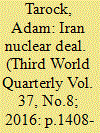|
|
|
Sort Order |
|
|
|
Items / Page
|
|
|
|
|
|
|
| Srl | Item |
| 1 |
ID:
146659


|
|
|
|
|
| Summary/Abstract |
Iran’s nuclear programme had for more than a decade become a controversial issue between Iran and the West; it had even threatened to develop into a military confrontation between Teheran and its arch adversary, Washington. The issue was finally resolved in an agreement, after more than a year of negotiations, between the two sides in Geneva in July 2015. This was hailed as a ‘breakthrough’ and a ‘win-win’ for both parties. It is argued here that the nuclear deal has made Iran’s nuclear programme almost inoperable, and pointed out that many members of Congress are vehemently against the deal; the next administration may not honour it or may revise it. The high costs of sanctions against Iran to the sanctioning countries are also examined, with a comparison made between the meagre concessions that Iran will get and the huge concessions that the West will receive under the deal. Furthermore, Iran has acceded to very intrusive inspection of some of its military sites. It is contended that, if the Iranians hope the agreement will soon bring about the resolution of other thorny regional and international issues that exist between Teheran and Washington, they are very likely to be disappointed.
|
|
|
|
|
|
|
|
|
|
|
|
|
|
|
|
| 2 |
ID:
075087


|
|
|
|
|
| Publication |
2006.
|
| Summary/Abstract |
Judged by the media reports and statements by US officials in recent months, the USA is seriously considering, or at least thinking about, taking military action against Iran, if it refuses to forgo its legal right to enrich uranium for its nuclear energy programme, which Washington claims is a cover for making nuclear weapons. Iran denies the allegation. The effects of such an attack on Iranian society and the political ramifications beyond Iran's borders are discussed and analysed here. The irony of the present dispute between the West and Iran is that, for three decades up to the Iranian revolution in 1979, the Europeans and Americans helped, in fact earnestly encouraged, Iran in the development of its nuclear programme. The article explains the reasons for the failure of talks between Iran and the European trio to resolve the issue. It argues that, even if the question of Iran's nuclear programme were resolved, the 27-year conflict between the two countries would be unlikely to end in the near future. For Washington the name of the game is 'regime change' in Iran, either through military means or through fomenting internal chaos, hoping for implosion. But considering the political and military difficulties that Washington is experiencing in Afghanistan and Iraq, achieving either of these options is highly problematic.
|
|
|
|
|
|
|
|
|
|
|
|
|
|
|
|
| 3 |
ID:
155068


|
|
|
|
|
| Summary/Abstract |
The West has shunned the Islamic Republic of Iran for most of the past 38 years. To neutralise the very negative impact that this situation has had on the country’s economy and political isolation, Iran has turned to the East, in particular to China and Russia, a change in orientation despite Iran’s traditional preference for the West. Since the Soviet Union’s demise, Iran and Russia have steadily been expanding co-operation in trade, regional security, nuclear technology, military issues, and oil and natural gas exploration and marketing. Yet both Powers have cautiously approached one other. The degree of expansion or contraction in co-operation has depended considerably on whether relations between the West and Russia have been amicable or hostile. Historically speaking, Great Power rivalry over Iran has worked better for Tehran than when these Powers have taken a unified policy, as in the nineteenth and twentieth centuries.
|
|
|
|
|
|
|
|
|
|
|
|
|
|
|
|
|
|
|
|
|